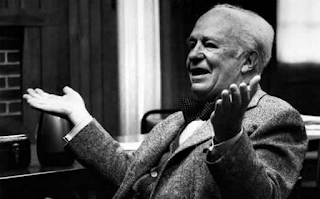A short time ago,
while we were in the throes of composing the series on Woodrow Wilson and the
Federal Reserve, we came
across a posting in a FaceBook group devoted to “distributism,” distributism being a
somewhat loose theory of political economy developed by G.K. Chesterton and
Hilaire Belloc advocating political democracy supported by widespread capital
ownership, with a preference for small, family-owned farms and artisan
businesses.
 |
| "Don't look at me! Adler's the one who alluded to distributism!" |
Latter day
distributists have let some things fall by the wayside, notably Chesterton’s
recommendation of something vaguely resembling the Employee Stock Ownership
Plan (ESOP) invented by Louis O. Kelso.
That is, if economies of scale demand a large enterprise, Chesterton
declared that the workers should own shares in the enterprise. (There's a faint possibility Chesterton picked up the idea from Peter S. Grosscup, one of Theodore Roosevelt's "Trust Busters," who seems to have been acquainted with Archbishop John Ireland as well, both being friends of Roosevelt, and both serving on the same committee in 1907. Grosscup advocated corporate reform to enable ordinary people to become shareholders in America's corporations as small ownership disappeared, and wrote a series of articles in major magazines at the turn of the last century to that effect.)
The FaceBook
posting was simply a link to an article, “G.K.
Chesterton’s Uncommonly Sensible Views of the Law,” with the note that
people might find it interesting, particularly since the article was by Mr.
Dale Ahlquist, president of the American
Chesterton Society, an organization (according to the website) established
“to promote the
writings and thoughts of G.K. Chesterton.”
The ACS's “simple mission is to bring Chesterton to as many people
as possible in as many ways as possible.”
Now, right up
front we have to apologize for commenting on Mr. Ahlquist’s piece. By the standards employed by the editorial
staff of Gilbert! magazine, the
official journal of the American Chesterton Society, the article was published
eleven years ago and is therefore irrelevant.
 |
| "Oh, man . . . that is, like, so ten minutes ago." |
If that sounds a
little odd, the fact is that we were recently severely chastised by said staff
for posting a link to an article that
referred to Chesterton in a somewhat dismissive fashion. This was on the grounds that 1) the piece is seven
years old — ’nuff said — and the author is 2) an idiot, 3) a useless old crank,
4) has no sense of humor, 5) is laughable, 6) embarrassing, 7) colossally
ignorant, 8) intellectually dishonest, and the article is 9) seven years old,
10) seven years old (third mention of this damning point), and 11) drivel.
If that’s not
enough, the author “should have been chased right out of academia.” Like the late, great Anna Russell, “I’m not
making this up, you know.” The comments
are verbatim. We withhold the name of
said editorial staff only to spare the blushes of the ACS.
 |
| "You couldn't make this stuff up." |
It
may seem a trifle ironic that we agreed up to a point with said editorial staff
and disagreed with the author of the article.
We only posted the article to generate some discussion on the points
raised . . . which had little to do with Chesterton, but a great deal to do
with possible distortions of Chesterton’s thought and work by latter day
Chestertonians.
Therefore
let us state up front that we do not consider Mr. Ahlquist’s article irrelevant
simply because it is eleven years old.
That would be rather silly in any event, as Mr. Ahlquist’s declared mission in
life is the promotion of the writings and thoughts of a man who died
eighty years ago, and we ourselves rely on the work of people, some of which
lived 2,500 years ago.
Furthermore,
lest there be any doubt, let us state explicitly that we are not going to call Mr.
Ahlquist an idiot, a useless old crank, humorless, laughable,
embarrassing, colossally ignorant, intellectually dishonest, or a discharger of
drivel. We'll leave that and similar ad hominem hysteria to others who seem to be better at it. At the risk of having these and
other accusations leveled at us, however, we admit that we (gasp) disagree with Mr. Ahlquist . . . which might be safer than agreeing with his editorial staff. We think he missed the boat on some points
Chesterton made repeatedly.
First,
however, some common ground. What Mr.
Ahlquist wrote appears to be in agreement with the legal
philosophy of the Just Third Way, at least superficially. The problem is he didn’t say enough, nor did
he get to the heart of the matter.
 |
| "Lex ratio, not lex voluntas, Dude." |
Specifically, Mr.
Ahlquist went right by the main point Chesterton made about human law. This is understandable for two reasons.
One, Chesterton
did not make it obvious, except — possibly — to those familiar with the work of
the solidarist jurist and political scientist Heinrich Rommen and the “Great
Books” philosopher Mortimer Adler (who taught philosophy of law at the
University of Chicago), and who might be able to correlate the work of Chesterton,
Msgr. Ronald Knox and Abp. Fulton Sheen together with some often overlooked
late nineteenth century movements and events.
Two, and possibly
more critically, Chestertonians and distributists, by and large, have shifted
away from lex ratio (law is reason)
and embraced lex voluntas (law is
will). They are thereby not prepared to
discern Chesterton’s rather pointed criticism of the sea change that took place
in western thought at the dawn of the modern age, and which runs through all of
his work in one form or another: the triumph of the Will over the Intellect —
which we will discuss tomorrow.
#30#
